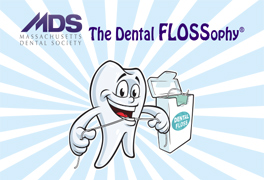Caring for Your Teeth
Caring for your teeth is essential for maintaining good oral hygiene and overall health. Learn more about how things like brushing and flossing, fluoride, and avoiding sugar can help you take care of your teeth.
Brushing and Flossing

Proper brushing techniques are essential to keeping your teeth and gums healthy. Brush twice a day for two minutes each time, and read here for more details on brushing techniques.
Flossing every day is key to maintaining healthy teeth and gums. The Dental FLOSSophy brochure educates children on when to start flossing, the ABCs of flossing, how often you should floss, what types of floss to use, and flossing versus toothpicks. There are also fun activities for children to complete to help reinforce the messages.
Tooth Decay and Sugar

The American Heart Association recommends that kids ages 2 to 18 should have less than 25 grams, or 6 teaspoons, of added sugars daily. That’s nearly impossible to achieve for soda drinkers, considering one 12-ounce can of regular soda contains 10 teaspoons of sugar—about 65% more added sugars than the recommended daily limit. Supersizing your beverage to a 20-ounce bottle of “pop” contains 16 teaspoons of the sweet stuff—230% more added sugars than the recommended daily limit!
Drinking sugar-sweetened beverages plays a major role in dental decay. Even with regular brushing and flossing, both regular and diet sodas can break down the enamel of teeth. Sugar-free soda is also harmful to teeth because it contains high amounts of acid, leading to a breakdown in dental enamel. And it doesn’t take long—this acid can begin to wreak havoc in only 20 minutes!
It’s not just soda that’s contributing to an increase in tooth decay. Nationwide, students are drinking more sports drinks and fruit juices, which also contain high concentrations of sugar. The problem is with the frequency that a child’s teeth are exposed to sugar throughout the day. Nursing soft drinks throughout the day significantly contributes to the development of tooth decay. Water is a good replacement for sugary drinks. Also, drinking a glass of water after eating has the added benefit of diluting acid in the mouth, helping to prevent tooth decay.
If any of these added sweeteners are listed as an ingredient in your drink, you may want to opt for water: cane crystals/sugar, corn sweetener, dextrin, evaporated cane juice, fruit juice concentrate, high fructose corn syrup, honey, malt syrup, maple syrup, molasses, most ingredients ending with the letters “ose” (e.g., fructose, lactose, sucrose maltose, dextrose).
Canning Tooth Decay Brochure
The Canning Tooth Decay brochure educates students, teachers, and parents on the effects that too much soda and other soft drinks can have on oral health.

